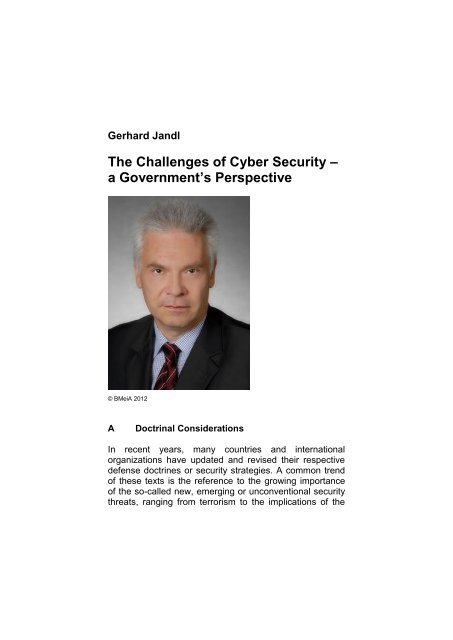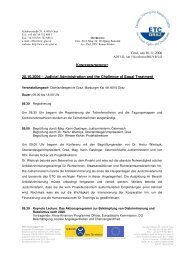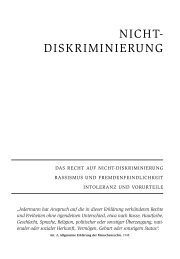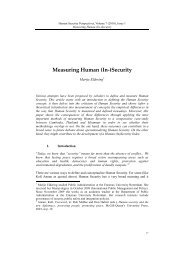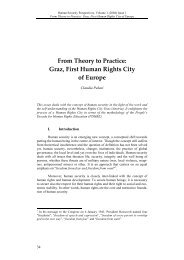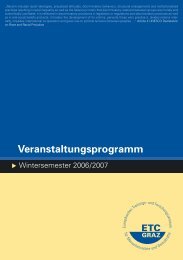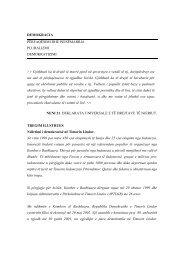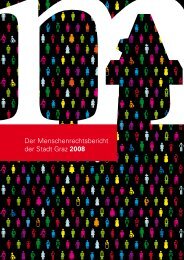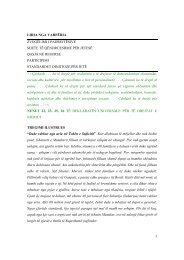The Challenges of Cyber Security – a Government's ... - ETC Graz
The Challenges of Cyber Security – a Government's ... - ETC Graz
The Challenges of Cyber Security – a Government's ... - ETC Graz
You also want an ePaper? Increase the reach of your titles
YUMPU automatically turns print PDFs into web optimized ePapers that Google loves.
Gerhard Jandl<br />
<strong>The</strong> <strong>Challenges</strong> <strong>of</strong> <strong>Cyber</strong> <strong>Security</strong> <strong>–</strong><br />
a Government’s Perspective<br />
© BMeiA 2012<br />
A Doctrinal Considerations<br />
In recent years, many countries and international<br />
organizations have updated and revised their respective<br />
defense doctrines or security strategies. A common trend<br />
<strong>of</strong> these texts is the reference to the growing importance<br />
<strong>of</strong> the so-called new, emerging or unconventional security<br />
threats, ranging from terrorism to the implications <strong>of</strong> the
<strong>The</strong> <strong>Challenges</strong> <strong>of</strong> <strong>Cyber</strong> <strong>Security</strong> <strong>–</strong> a Government’s Perspective 27<br />
financial crisis, from piracy to trans-border organized<br />
crime, from resources scarcity to the impact <strong>of</strong> climate<br />
change. Among these new challenges enumerated, cyber<br />
security usually figures very prominently. This is also true<br />
for the draft National <strong>Security</strong> Strategy <strong>of</strong> Austria which<br />
should replace the <strong>Security</strong> and Defense Doctrine dating<br />
from 2001. 1 <strong>The</strong> Austrian Federal Government approved<br />
the draft in March 2011, and conveyed it to Parliament for<br />
further consideration and eventual adoption as a<br />
Parliament Resolution (Entschließung des Nationalrats). 2<br />
A special Sub-Committee <strong>of</strong> the Defense Committee was<br />
formed and has held several meetings to date. <strong>The</strong><br />
opposition parties have proposed a number <strong>of</strong><br />
amendments. At this juncture, though, it cannot be<br />
indicated yet when the new National <strong>Security</strong> Strategy will<br />
be adopted by the Parliament and thus will enter into<br />
force.<br />
Various chapters <strong>of</strong> this draft specifically refer to<br />
cyber attacks, cyber criminality and the misuse <strong>of</strong> the<br />
Internet, and task the competent government agencies<br />
and ministries to continuously deal with this (and other<br />
relevant) items in their security-related activities. <strong>The</strong> draft<br />
also indicates the need for a comprehensive cyber<br />
security concept (see below).<br />
For reasons <strong>of</strong> orientation, let’s have a look at the<br />
respective provisions in the key strategic documents <strong>of</strong> EU<br />
and NATO. As regards the EU, cyber security is not<br />
1<br />
Austrian Parliament, Resolution 114/E (XXI. GP), 12 December<br />
2001.<br />
2<br />
Austrian Parliament, Report <strong>of</strong> the Federal Governent on the<br />
Austrian <strong>Security</strong> Strategy <strong>–</strong> <strong>Security</strong> in a New Decade:<br />
Developing <strong>Security</strong> (Bericht der Bundesregierung betr.<br />
Österreichische Sicherheitsstrategie. Sicherheit in einer neuen<br />
Dekade <strong>–</strong> Sicherheit gestalten), Doc. III-218 der Beilagen XXIV.<br />
GP. Available online at: http://www.parlament.gv.at/PAKT/VHG<br />
/ XXIV/III/III_00218/index.shtml. (All websites used in this essay<br />
were last checked on 27 June 2012).
Gerhard Jandl 28<br />
explicitly addressed in the European <strong>Security</strong> Strategy <strong>of</strong><br />
2003, 3 but in the High Representative’s 2008 Report on<br />
the Implementation <strong>of</strong> the European <strong>Security</strong> Strategy <strong>–</strong><br />
Providing <strong>Security</strong> in a Changing World:<br />
“Modern economies are heavily reliant on critical<br />
infrastructure including transport, communication and<br />
power supplies, but also the Internet. <strong>The</strong> EU<br />
Strategy for a Secure Information Society, adopted in<br />
2006 addresses Internet-based crime. However,<br />
attacks against private or government IT systems in<br />
EU Member States have given this a new dimension,<br />
as a potential new economic, political and military<br />
weapon. More work is required in this area, to<br />
explore a comprehensive EU approach, raise<br />
awareness and enhance international co-operation.” 4<br />
NATO’s new Strategic Concept <strong>of</strong> 2010 treats the<br />
cyber area very prominently:<br />
“<strong>Cyber</strong> attacks are becoming more frequent, more<br />
organized and more costly in the damage that they<br />
inflict on government administrations, businesses,<br />
economies and potentially also transportation and<br />
supply networks and other critical infrastructure; they<br />
can reach a threshold that threatens national and<br />
Euro-Atlantic prosperity, security and stability.<br />
Foreign militaries and intelligence services,<br />
3 European Union, A Secure Europe in a Better World <strong>–</strong><br />
European <strong>Security</strong> Strategy, 12 December 2003.<br />
4 European Union, Providing <strong>Security</strong> in a Changing World,<br />
Report on the Implementation <strong>of</strong> the European <strong>Security</strong><br />
Strategy, S407/08, 11 December 2008, at p. 5.
<strong>The</strong> <strong>Challenges</strong> <strong>of</strong> <strong>Cyber</strong> <strong>Security</strong> <strong>–</strong> a Government’s Perspective 29<br />
organized criminals, terrorist and/or extremist groups<br />
can each be the source <strong>of</strong> such attacks.” 5<br />
And it pledges to “develop further our ability to<br />
prevent, detect, defend against and recover from cyber<br />
attacks, including by using the NATO planning process to<br />
enhance and coordinate national cyber-defense<br />
capabilities, bringing all NATO bodies under centralized<br />
cyber protection, and better integrating NATO cyber<br />
awareness, warning and response with member nations”. 6<br />
<strong>The</strong> evolution <strong>of</strong> the language between 2003 and<br />
2010 illustrates the growing importance <strong>of</strong> the cyber issue<br />
over the past years.<br />
B <strong>The</strong> Austrian Draft National <strong>Security</strong> Strategy<br />
Although this is not the place to discuss the contents <strong>of</strong><br />
the draft National <strong>Security</strong> Strategy in detail, 7 a short<br />
sketch <strong>of</strong> the main lines might be useful. <strong>The</strong> document<br />
starts from the following considerations:<br />
traditional threats and challenges to security are<br />
becoming less imminent; new and more complex<br />
threats/challenges are becoming more important;<br />
the role <strong>of</strong> international organizations is growing,<br />
the role <strong>of</strong> state actors relatively declining;<br />
5 NATO, Active Engagement, Modern Defense - Strategic<br />
Concept for the Defense and <strong>Security</strong> <strong>of</strong> the Members <strong>of</strong> the<br />
North Atlantic Treaty Organization, NATO Summit, Lisbon, 19-<br />
20 November 2010, 2010, at para. 12.<br />
6 NATO, Active Engagement, Modern Defense - Strategic<br />
Concept for the Defense and <strong>Security</strong> <strong>of</strong> the Members <strong>of</strong> the<br />
North Atlantic Treaty Organization, at para.19.<br />
7 For a more detailed discussion, see Jandl, Gerhard, Zur<br />
zeitgemäßen Aufgabe österreichischer Sicherheitspolitik, in:<br />
Khol, Andreas, Günther Ofner, Stefan Karner and Dietmar<br />
Halper (eds.), Österreichisches Jahrbuch für Politik 2011,<br />
Böhlau Verlag, Vienna, 2012, at pp. 365 ff.
Gerhard Jandl 30<br />
a comprehensive approach according to the<br />
principle <strong>of</strong> comparative advantages <strong>of</strong> the<br />
respective actors is needed on the international and<br />
regional levels;<br />
a more interactive and integrated approach<br />
(civilian/military) is needed on the domestic level<br />
(the so-called “whole <strong>of</strong> government approach”);<br />
security increasingly also comprises economic,<br />
social, development and interior security aspects<br />
(which is why the draft National <strong>Security</strong> Strategy<br />
contains detailed language also on domestic<br />
security issues).<br />
<strong>The</strong> draft National <strong>Security</strong> Strategy commends the<br />
new role <strong>of</strong> the post-Lisbon Treaty EU in crisis<br />
management, including the clause which requires Member<br />
States to improve their capabilities and make them<br />
available to the EU. It welcomes NATO’s Strategic<br />
Concept <strong>of</strong> 2010, including NATO’s increased ambitions in<br />
international crisis management, in cooperative security, in<br />
tackling new security challenges, and in the upgrading <strong>of</strong><br />
its partnerships.<br />
According to the draft National <strong>Security</strong> Strategy,<br />
Austria will craft its security policy mainly in the<br />
frameworks <strong>of</strong> the UN, the EU, the OSCE and NATO<br />
partnerships. It pledges continued Austrian cooperation<br />
within and with these organizations, and Austrian<br />
contributions to their respective endeavors. Participation in<br />
international crisis management missions/operations is<br />
understood as an essential element <strong>of</strong> this policy. Crisis<br />
prevention, mediation and the support <strong>of</strong> disarmament<br />
measures are further important elements.<br />
Defense policy is defined as an integral part <strong>of</strong> the<br />
Comprehensive <strong>Security</strong> Provision (Umfassende
<strong>The</strong> <strong>Challenges</strong> <strong>of</strong> <strong>Cyber</strong> <strong>Security</strong> <strong>–</strong> a Government’s Perspective 31<br />
Sicherheitsvorsorge), 8 as being required to cooperate with<br />
internal security and foreign policies, and as comprising:<br />
the defense <strong>of</strong> sovereignty and territorial integrity; the<br />
protection <strong>of</strong> constitutional institutions and critical<br />
infrastructure (a supporting role to the organs <strong>of</strong> domestic<br />
security); the protection <strong>of</strong> the population, including in<br />
case <strong>of</strong> natural disasters; a contribution to ensuring the<br />
functioning <strong>of</strong> the state institutions; the participation in<br />
international crisis management; and a contribution to the<br />
EU’s security policy. Emerging security challenges can<br />
lead to new tasks for the Austrian armed forces and other<br />
<strong>of</strong>ficial institutions and bodies.<br />
C Particular <strong>Challenges</strong> from a Government <strong>–</strong> and a<br />
Personal <strong>–</strong> Perspective<br />
Turning now to the challenges for government reaction to<br />
the said risks, let me say a few words from the<br />
background <strong>of</strong> my position as <strong>Security</strong> Policy Director,<br />
though with a personal underpinning.<br />
Let’s embark from the observation that the changes<br />
and advances in technology, in particular in IT technology,<br />
are not happening at a “bureaucratic” pace, but<br />
exponentially faster. One has only to mention inventions<br />
like Twitter, Facebook, Cloud Computing, and others.<br />
Risks and dangers involved are growing by the same<br />
speed as the innovations themselves. This puts<br />
governments in a very difficult situation. Not only because<br />
state administrations are, more or less by definition,<br />
slower than innovative industries. But also because state<br />
action <strong>–</strong> or rather reaction <strong>–</strong> must (a) be based on a broad<br />
political consensus <strong>of</strong>, at least, the parliamentary majority,<br />
8 On the current defense policy strategy, see: Austrian Ministry <strong>of</strong><br />
Defence Teilstrategie Verteidigungspolitik, 2010. Available<br />
online at: http://www.bmlv.gv.at/facts/bh_2010/archiv/pdf/teil<br />
strategie_vertpol.pdf.
Gerhard Jandl 32<br />
preferably though on that <strong>of</strong> a much wider societal<br />
majority; and (b) must <strong>–</strong> both in the process <strong>of</strong> its<br />
elaboration and in its contents <strong>–</strong> respect the fundamental<br />
principles <strong>of</strong> our society, such as the rule <strong>of</strong> law, the<br />
separation <strong>of</strong> powers, the individual freedoms, etc. Such<br />
processes obviously take time.<br />
Why did I say “rather reaction than action” when it<br />
comes to the role <strong>of</strong> the state? This is not to advocate the<br />
state having a passive, reactive role in general <strong>–</strong> far from<br />
it. Rather, the word “reaction” seems to be a better notion<br />
than “action” because freedom <strong>of</strong> opinion, freedom <strong>of</strong><br />
expression, freedom <strong>of</strong> information are values <strong>of</strong> such<br />
paramount importance that state authorities must not<br />
interfere here, unless in circumstances under which it is<br />
absolutely inevitable. I take it that these considerations<br />
and convictions are being equally shared by <strong>–</strong> hopefully <strong>–</strong><br />
many if not all decision makers in democratic and liberal<br />
societies.<br />
When, hence, is such state intervention inevitable?<br />
One can see a number <strong>of</strong> cases <strong>–</strong> the clustering <strong>of</strong> which<br />
is basically geared to the cutting-edge discussion at the<br />
2011 Munich <strong>Security</strong> Conference: 9<br />
When IT technology is used for criminal purposes <strong>–</strong><br />
cyber crime in other words. For example, the use <strong>of</strong><br />
Internet means to illegally transfer money, to steal<br />
money from other peoples’ bank accounts, to carry<br />
out industrial espionage, to spread or consume<br />
child pornography etc. <strong>The</strong> required state action<br />
consists, in my view, in the elaboration and<br />
implementation <strong>of</strong> appropriate penal norms.<br />
9 See e.g.: Habig, Cornelia, Der <strong>Cyber</strong>space stellt die Welt vor<br />
komplexe Herausforderungen, 5 February 2011. Available<br />
online at: http://www.securityconference.de/TOP-NEWS.638+<br />
M59693ca518f.0.html.
<strong>The</strong> <strong>Challenges</strong> <strong>of</strong> <strong>Cyber</strong> <strong>Security</strong> <strong>–</strong> a Government’s Perspective 33<br />
When the Internet is used for the radicalization <strong>of</strong><br />
people, that is when hate speech is being spread,<br />
intolerance and violent or terrorist activities against<br />
other nations, races or followers <strong>of</strong> different belief<br />
or conviction, is being incited and the formation <strong>of</strong><br />
groups for such purposes is being attempted. <strong>The</strong><br />
required state action here is a combination <strong>of</strong><br />
inhibiting such contents with, again, the elaboration<br />
and implementation <strong>of</strong> appropriate penal norms.<br />
When IT technology is used for so-called cyber<br />
attacks,that is for attacks on the very existence and<br />
fundamental safety <strong>of</strong> our countries, economies and<br />
societies. Attacks designed, for example, to bring<br />
down the electricity distribution, the health system,<br />
the financial and commercial infrastructure or the<br />
defense system on such a large scale that public<br />
life cannot continue to function properly or that<br />
national security is at stake. In those cases, the<br />
state must see to it that its crucial networks are safe<br />
and resilient and must constantly update the<br />
relevant protection measures.<br />
It is obvious that no single ministry or even single<br />
government agency can fulfill these tasks alone. A “whole<strong>of</strong>-government”<br />
approach or, indeed, a “whole-<strong>of</strong>-nation”<br />
approach involving also private stakeholders is required.<br />
Furthermore, no single country can successfully act just by<br />
itself. International cooperation becomes more and more<br />
pivotal, including with relevant international organizations<br />
that play an ever increasing role. This fact, by the way, is<br />
underlined in practically all recent doctrinal documents <strong>of</strong><br />
states and international organizations.
Gerhard Jandl 34<br />
D <strong>The</strong> Austrian Response, Nationally…<br />
Let me now give you a short overview over what has been<br />
going on Austrian government level in the cyber security<br />
area. <strong>The</strong> well-developed national crisis response<br />
mechanisms and structures are being utilized to meet also<br />
new challenges such as cyber security. <strong>The</strong> coordination<br />
competence rests with the Federal Chancellery, which has<br />
established a government Computer Emergency<br />
Response Team (CERT) in 2008 in order to integrate<br />
cyber security efforts <strong>of</strong> the public and private sectors. <strong>The</strong><br />
Federal Chancellery coordinates cyber crisis management<br />
with other government, CERT stakeholders and in<br />
consultation with experts from the Ministries <strong>of</strong> Interior and<br />
Defence. In 2010, the "Internet Offensive Austria" <strong>–</strong> a joint<br />
initiative <strong>of</strong> the ICT stakeholders <strong>of</strong> Austria (leading local<br />
ICT companies, research institutions and interest groups)<br />
<strong>–</strong> developed a national ICT strategy, the “Austria Internet<br />
Declaration”. Moreover, government has set up a Center<br />
<strong>of</strong> Excellence for the Internet Society, which uses this<br />
Declaration as a comprehensive guideline for the future<br />
“whole-<strong>of</strong>-government” approach.<br />
At present, a number <strong>of</strong> cyber security related<br />
initiatives are ongoing in Austria. In particular:<br />
At the initiative <strong>of</strong> the Federal Chancellery and<br />
CERT.at, an Austrian Trust Circle was founded as a<br />
multi-sectoral platform <strong>of</strong> ICT security experts from the<br />
private sector. This platform will play an essential role,<br />
in particular by providing crisis management<br />
capabilities for the local infrastructure against cyber<br />
security threats. A number <strong>of</strong> expert groups have<br />
already been established for various sectors, such as<br />
finance and health care.<br />
A number <strong>of</strong> research projects on cyber threats have<br />
been identified and started.
<strong>The</strong> <strong>Challenges</strong> <strong>of</strong> <strong>Cyber</strong> <strong>Security</strong> <strong>–</strong> a Government’s Perspective 35<br />
Austria has set up a Private Public Partnership<br />
Program for Critical Infrastructure Protection (APCIP)<br />
with the objective to develop a comprehensive strategy<br />
and detailed measures and to bring all relevant public<br />
and private organizations and infrastructure operators<br />
under one common conceptual ro<strong>of</strong>.<br />
<strong>The</strong> Defense Ministry is further developing its cyber<br />
defense capabilities by setting up a military CERT.<br />
<strong>The</strong> Interior Ministry has started to elaborate a <strong>Cyber</strong><br />
Risk Matrix and Analysis, involving the academic,<br />
business, administration and political communities.<br />
<strong>The</strong> individual activities carried out by various<br />
ministries and agencies will be consolidated by a future<br />
national cyber security concept, as mentioned by the draft<br />
National <strong>Security</strong> Strategy. Preparatory works within the<br />
Secretariat <strong>of</strong> the National <strong>Security</strong> Council have begun<br />
recently, and it is foreseen to set up such a structure<br />
within the first half <strong>of</strong> 2012.<br />
E …and Internationally<br />
Austria has also been promoting the issue <strong>of</strong> cyber<br />
security in different international organisations.<br />
In OSCE, Austria is among a group <strong>of</strong> Participating<br />
States promoting cyber security issues within that<br />
organization. In particular, it advocates the development <strong>of</strong><br />
Confidence and <strong>Security</strong> Building Measures (CSBMs) and<br />
training activities in field missions.<br />
In the Council <strong>of</strong> Europe, Austria holds the position <strong>of</strong><br />
<strong>The</strong>matic Coordinator on Information Policy Internet<br />
Governance, playing an important role in drafting the new<br />
Council <strong>of</strong> Europe Strategy on Internet Governance 2012
Gerhard Jandl 36<br />
<strong>–</strong> 2015 which involves NGOs and puts particular emphasis<br />
on compliance with Human Rights. 10<br />
But perhaps most importantly, Austria and NATO <strong>–</strong><br />
the latter being the very organization most advanced in the<br />
cyber field 11 <strong>–</strong> have commenced a comprehensive bilateral<br />
cooperation scheme on all relevant aspects <strong>of</strong> cyber<br />
security. Austria has been the first country (not only<br />
partner country) ever to start such collaboration, under the<br />
aegis <strong>of</strong> NATO’s newly established Emerging <strong>Security</strong><br />
<strong>Challenges</strong> Division, in the fall <strong>of</strong> 2011. 12 To date, half a<br />
dozen other states have followed this example.<br />
A number <strong>of</strong> possible areas <strong>of</strong> cooperation have<br />
been identified: harmonization <strong>of</strong> crisis management<br />
procedures; exchange <strong>of</strong> relevant information and<br />
assessments; mutual inclusion in research projects; joint<br />
mentorships in third countries to raise awareness;<br />
development <strong>of</strong> joint “lessons learned” processes,<br />
including on cyber aspects <strong>of</strong> crisis management<br />
operations; establishment and enhancement <strong>of</strong> cyber<br />
security related capabilities and procedures; training and<br />
exercises (including at the NATO Cooperative <strong>Cyber</strong><br />
Defense Center in Tallinn); and the involvement <strong>of</strong> the<br />
private sector, as appropriate.<br />
10 See: Council <strong>of</strong> Europe, Information society and Internet<br />
governance, "Our Internet - Our Rights, Our Freedoms":<br />
Towards the Council <strong>of</strong> Europe Strategy on Internet<br />
Governance 2012-2015, 2011. Available online at:<br />
http://www.coe.int/t/informationsociety/conf2011/.<br />
11 See NATO, NATO and <strong>Cyber</strong> defence, 2012. Available online<br />
at: http://www.nato.int/cps/en/natolive/topics_78170.htm?.<br />
12 On the event launching that cooperation, see e.g.: Kurier,<br />
„<strong>Cyber</strong>-Sicherheit: NATO spricht mit Österreich“, 4 November<br />
2011. On Austria’s partnership with NATO in general, see<br />
NATO, NATO’s relations with Austria, 2012. Available online at:<br />
http://www.nato.int/cps/en/SID-F47CD065-<br />
4BB3E8E8/natolive/topics_48901.htm.
<strong>The</strong> <strong>Challenges</strong> <strong>of</strong> <strong>Cyber</strong> <strong>Security</strong> <strong>–</strong> a Government’s Perspective 37<br />
Moreover, Austria has been actively participating in<br />
the implementation <strong>of</strong> NATO’s <strong>Cyber</strong> Policy and Action<br />
Plan, ins<strong>of</strong>ar as it is open to partners. NATO has<br />
suggested the inclusion <strong>of</strong> a number <strong>of</strong> cyber security<br />
related projects in the Individual Partnership Cooperation<br />
Program (IPCP) and the Planning and Review Process<br />
(PARP) <strong>–</strong> the two main cooperation instruments for<br />
partners like Austria <strong>–</strong> and it is certainly hoped that this<br />
proposal will be implemented swiftly.


